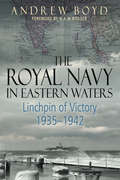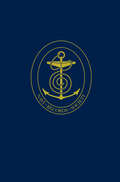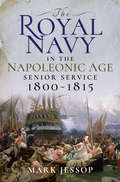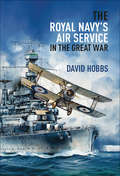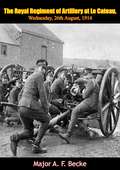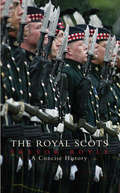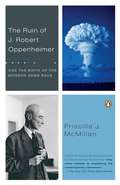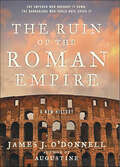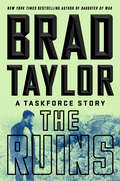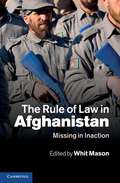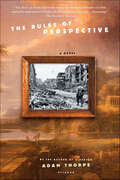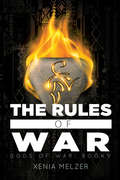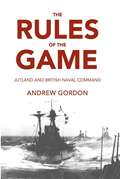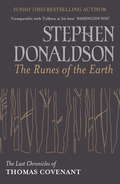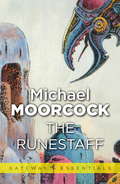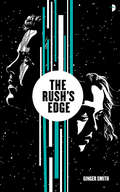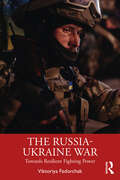- Table View
- List View
The Royal Navy in Eastern Waters: Linchpin of Victory, 1935–1942
by Andrew BoydHow British naval power in the Indian Ocean played a critical early role in WWII: &“Commands the reader's attention. . . . a history game-changer.&” —Warship, Naval Books of the Year This new work tells the compelling story of how the Royal Navy secured the strategic space from Egypt in the west to Australasia in the East through the first half of the Second World War—and explains why this contribution, made while Russia&’s fate remained in the balance and before American economic power took effect, was so critical. Without it, the war would certainly have lasted longer and decisive victory might have proved impossible. After the protection of the Atlantic lifeline, this was surely the Royal Navy&’s finest achievement, the linchpin of victory. The book moves authoritatively between grand strategy, intelligence, accounts of specific operations, and technical assessment of ships and weapons. It challenges established perceptions of Royal Navy capability and will change the way we think about Britain&’s role and contribution in the first half of the war. The Navy of 1939 was stronger than usually suggested and British intelligence did not fail against Japan. Nor was the Royal Navy outmatched by Japan, coming very close to a British Midway off Ceylon in 1942. And it was the Admiralty, demonstrating a reckless disregard for risks, that caused the loss of Force Z in 1941. The book also lays stress on the key part played by the American relationship in Britain&’s Eastern naval strategy. Superbly researched and elegantly written, it adds a hugely important dimension to our understanding of the war in the East.
The Royal Navy in River Plate 1806–1807 (Navy Records Society Publications #Vol. 135)
by John D. GraingerThis book presents a collection of contemporary documents throwing light on the campaigns by the Royal Navy, in association with the army, on cities of the Spanish Empire in South America, beginning with the (unauthorised) assault on Buenos Aires in 1806, by Sir Home Popham. One of Popham’s aims was to open South America for British trade and also perhaps to liberate the land from its supposed Spanish oppressors, and although the people of Buenos Aires may not have wished to remain as Spanish subjects, it soon became apparent that they had no wish to become British subjects. It was this fact that led to the subsequent loss of Buenos Aires only six weeks after its capture, and the net result of Popham’s interventions was to begin the process of South American independence and the collapse of the Spanish Empire.
The Royal Navy in the Falklands Conflict and the Gulf War: Culture and Strategy (British Politics and Society)
by Alistair FinlanThis book suggests that institutional culture can account for a great deal of the activities and rationale of the Royal Navy. War highlights the role of culture in military organizations and as such acts as a spotlight by which this phenomenon can be assessed seperately and then in comparison in order to demonstrate the influence of institutional culture on strategy.
The Royal Navy in the Napoleonic Age: Senior Service, 1800–1815
by Mark Jessop&“Takes us into areas that aren&’t always covered . . . stand[s] out from the crowd of Napoleonic Naval studies.&” —History of War In 1801, the newly forged United Kingdom of Great Britain and Ireland commenced its existence at war with France and her allies—and remained so until 1815. After 1812, she had to shoulder the extra burden of a war against the United States of America. With conflict on multiple fronts, hardships continued to be inflicted at home. Trade was made precarious. People became bone-weary of hostilities and the threat of invasion ran high. Napoléon Bonaparte was no ordinary opponent, and the United States navy showed the world the worth of her ships, but what stood in their way was the Royal Navy. Despite notable losses, after the victory of Trafalgar in 1805 she dominated the seas. Although not the only means, her warships were the nation&’s first line of defense that helped keep British shores safe. As the era ended it was obvious the navy had to change. Steam began to alter perspectives with new opportunities. But the Royal Navy would remain what it had been: A naval superpower. Britain&’s oldest continual military force. The senior service.
The Royal Navy's Air Service in the Great War
by David HobbsIn a few short years after 1914 the Royal Navy practically invented naval air warfare, not only producing the first effective aircraft carriers, but also pioneering most of the techniques and tactics that made naval air power a reality. By 1918 the RN was so far ahead of other navies that a US Navy observer sent to study the British use of aircraft at sea concluded that any discussion of the subject must first consider their methods. Indeed, by the time the war ended the RN was training for a carrier-borne attack by torpedo-bombers on the German fleet in its bases over two decades before the first successful employment of this tactic, against the Italians at Taranto.Following two previously well-received histories of British naval aviation, David Hobbs here turns his attention to the operational and technical achievements of the Royal Naval Air Service, both at sea and ashore, from 1914 to 1918. Detailed explanations of operations, the technology that underpinned them and the people who carried them out bring into sharp focus a revolutionary period of development that changed naval warfare forever. Controversially, the RNAS was subsumed into the newly created Royal Air Force in 1918, so as the centenary of its extinction approaches, this book is a timely reminder of its true significance.
The Royal Regiment of Artillery at Le Cateau: Wednesday, 26th August, 1914
by Major A. F. BeckeThis book, first published in 1919, represents a study undertaken by former Royal Artillery Major Archibald Frank Becke on the action fought by General Sir H. Smith-Dorrien and the troops under his command on August 26th, 1914 at Le Cateau--a critical day that proved not only a triumph for the British arms, but had a most important bearing on the whole retreat.The book served to show Officers of the Regiment the use that will be made of their War Diaries, and the nature of the information that is required for historical work, and also to encourage all Officers who were present at the battle to submit any further information that was in their possession. Lastly, Becke intended the book to be of scholarly use.
The Royal Scots: A Concise History
by Trevor RoyleThe Royal Scots are Scotland's oldest infantry regiment, with a tradition that stretches back to 1633. This first concise history of the regiment is based largely on the recollections of several generations of Royal Scots - men like Private McBane, who carried his three-year-old son into battle at Malplaquet, and Private Begbie, the youngest soldier to serve in the First World War. These first-hand accounts take the reader through the great wars of the eighteenth century, when Britain was a rising global power, through the setbacks and the triumphs of the Napoleonic Wars and on to the glorious years of the nineteenth century. The two world wars of the twentieth century saw the Royals expand in size, and there are full accounts of its meritorious service on all the main battle fronts. More recently, the regiment has been involved in operations in the Balkans and Iraq. In 2006, in one of the most radical changes in the country's defence policy, the Royal Scots will be amalgamated into the new Royal Regiment of Scotland. Royal Scots is, therefore, a timely celebration of the British Army's most venerable regiment, right of the line and second to none.
The Royal Show: A brand new series from the nation’s favourite entertainer, Anton Du Beke
by Anton Du BekeBy Royal invitation, join us to celebrate The Royal Show!Prodigal son and loyal daughter...The Forsyth Variety Company has been given the opportunity of a lifetime - to entertain Her Majesty at 1962's Royal Variety Performance.Keen to rehearse, the company heads to the Seagate Theatre under the tutelage of the company's owner, Ed Forsyth. This is Ed's last hoorah before retiring and he's keen to leave on a high. But his son, Cal, has absconded, leaving his twin sister, Evie, to help manage the company after their mother's death. Hoping to display her best trapeze performance ever, she's also desperate that the entire troupe should succeed. If only her father hadn't brought in another old-timer... Billy Rich has come all the way from Hollywood, invited to be their main star. Billy is full of bluster and ego and his much younger wife, the mysterious Magdalene, doesn't help.Can this troupe of old-time crooners, dancing girls and magicians possibly pull this off? Especially when they must compete with the 1960's rebellious new bands and revolutionary music? Abandoned by her brother, Evie has no idea if she'll ever be able to wrestle the troupe into a show fit for a queen.But as the theatrical group heads towards a royal deadline like no other, Cal returns out of the blue to introduce a song that could change the world. Is he here to help, or are his motivations darker? As the company descends into illicit romance, family intrigue and foul crimes, rehearsals begin to unravel. Can they really do this?Cal thinks he has the answer, if only the troupe can believe in him.Because the queen's show must go on...
The Royal Show: A brand new series from the nation’s favourite entertainer, Anton Du Beke
by Anton Du BekeBy Royal invitation, join us to celebrate The Royal Show!Prodigal son and loyal daughter...The Forsyth Variety Company has been given the opportunity of a lifetime - to entertain Her Majesty at 1962's Royal Variety Performance.Keen to rehearse, the company heads to the Seagate Theatre under the tutelage of the company's owner, Ed Forsyth. This is Ed's last hoorah before retiring and he's keen to leave on a high. But his son, Cal, has absconded, leaving his twin sister, Evie, to help manage the company after their mother's death. Hoping to display her best trapeze performance ever, she's also desperate that the entire troupe should succeed. If only her father hadn't brought in another old-timer... Billy Rich has come all the way from Hollywood, invited to be their main star. Billy is full of bluster and ego and his much younger wife, the mysterious Magdalene, doesn't help.Can this troupe of old-time crooners, dancing girls and magicians possibly pull this off? Especially when they must compete with the 1960's rebellious new bands and revolutionary music? Abandoned by her brother, Evie has no idea if she'll ever be able to wrestle the troupe into a show fit for a queen.But as the theatrical group heads towards a royal deadline like no other, Cal returns out of the blue to introduce a song that could change the world. Is he here to help, or are his motivations darker? As the company descends into illicit romance, family intrigue and foul crimes, rehearsals begin to unravel. Can they really do this?Cal thinks he has the answer, if only the troupe can believe in him.Because the queen's show must go on...
The Royal Windsor Secret: A Novel
by Christine WellsCould she be the secret daughter of the Prince of Wales? In this dazzling novel by the author of Sisters of the Resistance, a young woman seeks to discover the truth about her mysterious past. Perfect for readers of Shana Abe, Bryn Turnbull, and Marie Benedict. Cleo Davenport has heard the whispers: the murmured conversations that end abruptly the second she walks into a room. Told she was an orphan, she knows the rumor—that her father is none other than the Prince of Wales, heir to the British throne. And at her childhood home at Cairo’s Shepheard’s Hotel, where royals, rulers, and the wealthy live, they even called her “The Princess.”But her life is turned upside down when she turns seventeen. Sent to London under the chaperonage of her very proper aunt, she’s told it’s time to learn manners and make her debut. But Cleo’s life can’t be confined to a ballroom. She longs for independence and a career as a jewelry designer for Cartier, but she cannot move forward until she finds out about her past.Determined to unlock the truth, Cleo travels from London, back to Cairo, and then Paris, where her investigations take a shocking turn into the world of the Parisian demi-monde, and a high-class courtesan whose scandalous affair with the young Prince of Wales threatened to bring down the British monarchy long before anyone had heard of Wallis Simpson.
The Ruin of J. Robert Oppenheimer and the Birth of the Modern Arms Race
by Priscilla McmillanIn a groundbreaking book that recasts the history of the Cold War, bestselling author Priscilla J. McMillan exposes, for the first time, the truth behind J. Robert Oppenheimer's 1954 trial on charges of violating national security. Drawing on newly declassified papers and extensive interviews, McMillan places Oppenheimer's opposition to development of the hydrogen bomb at the heart of the story--opposition that made him the victim of government officials who, conspiring with rival scientist Edward Teller, deceived President Eisenhower and trapped the enigmatic genius who had done more than anyone to build the atomic bomb. A chilling exposé of the McCarthy-era conspiracy that helped propel the East-West arms race, this is a spellbinding work of history.
The Ruin of the Roman Empire: A New History
by James Joseph O'Donnell“A learned and often visceral account of how the Mediterranean ceased to be Roman, which serves simultaneously as charge sheet and lament.” —Tom Holland, award-winning author of DominionThe dream Alexander the Great and Julius Caesar shared of uniting Europe, the Mediterranean, and the Middle East in a single community shuddered and then collapsed in the wars and disasters of the sixth century. Historian and classicist James J. O'Donnell—who last brought readers his masterful, disturbing, and revelatory biography of Saint Augustine—revisits this old story in a fresh way, bringing home its sometimes painful relevance to today's issues.With unexpected detail and in his hauntingly vivid style, O'Donnell begins at a time of apparent Roman revival and brings readers to the moment of imminent collapse that just preceded the rise of Islam. Illegal migrations of peoples, religious wars, global pandemics, and the temptations of empire: Rome's end foreshadows today's crises and offers hints how to navigate them—if present leaders will heed this story.“An exotic and instructive tale, told with life, learning and just the right measure of laughter on every page. O’Donnell combines a historian’s mastery of substance with a born storyteller’s sense of style to create a magnificent work of art.” —Madeleine K. Albright, former U.S. Secretary of State“O'Donnell's richly layered book provides significant glimpses into the many factors that leveled a mighty empire.” —Publishers Weekly“O’Donnell provides a sweeping panorama that includes diverse Christian sects, surprisingly civilized barbarians, and ordinary humans striving to survive in an unstable world.” —Booklist
The Ruins: A Taskforce Story
by Brad TaylorRetired Special Forces officer Brad Taylor's thrilling new short story sets Pike Logan and Jennifer Cahill on a hunt for an ancient Mayan temple and reveals the origin of their archaeological company, the cover for their clandestine work with the Taskforce.Deep in the Maya Biosphere Reserve, a huge protected tract of rain forest in northern Guatemala, lies the mythical Temple of Priests. Only one man knew of the temple's location, but he was killed before he could relay the coordinates. Now, newly reinstated Taskforce operator Pike Logan has the grid location of the ruins, and he's convinced Jennifer Cahill to travel to Guatemala in search of the Mayan temple her uncle died trying to find. But Pike and Jennifer are not the only ones heading into the rain forest in search of hidden treasure. A Canadian mining company is determined to explore the Biosphere for rare earth metals, even if it means destroying the way of life for local villagers. When they learn that Pike and Jennifer's impending historical discovery might thwart their plans, it sets the newly minted team on a crash course with a group of men hellbent on getting their hands on the prize, no matter the cost. Includes an excerpt from Brad Taylor's latest Pike Logan thriller, Daughter of War.
The Rule of Law in Afghanistan: Missing in Inaction
by Whit MasonHow, despite the enormous investment of blood and treasure, has the West's ten-year intervention left Afghanistan so lawless and insecure? The answer is more insidious than any conspiracy, for it begins with a profound lack of understanding of the rule of law, the very thing that most dramatically separates Western societies from the benighted ones in which they increasingly intervene. This volume of essays argues that the rule of law is not a set of institutions that can be exported lock, stock and barrel to lawless lands, but a state of affairs under which ordinary people and officials of the state itself feel it makes sense to act within the law. Where such a state of affairs is absent, as in Afghanistan today, brute force, not law, will continue to rule.
The Rules of Perspective: A Novel
by Adam ThorpeOn April 3, 1945, the advancing American army shells the historic town of Lohenfelde, and the Kaiser-Wilhelm museum. Within the museum's vaults, Heinrich Hoffer is hiding from the bombardment, and trying to keep a priceless Van Gogh from falling into the hands of a rogue Nazi. After the shelling, an American corporal, Neal Parry, finds a beautiful eighteenth-century oil painting in the rubble, and must confront both its beauty, and the morality of stealing it. The stories of Herr Hoffer, Parry, and their paintings unfold simultaneously in this gripping, brilliantly structured novel about art and war.
The Rules of War (Gods of War #5)
by Xenia MelzerThe final war is on the horizon.Years ago Renaldo would have said all is fair in love and war. Now he’s sure nothing is. His husband, Casto, has left him, and without his touchstone, Renaldo cannot control his powers.The loss could not come at a worse time. The Good Mother and her followers are stretching out in a power grab, dividing the forces of the Gods of War and putting their victory in jeopardy.<br style="color: #3c4043; font-family: Roboto, Arial, sans-serif; font-size: 14px; font-style: normal; font-variant-ligatures: normal; font-variant-caps: normal; font-weight: 400; letter-spacing: 0.2px; orphans: 2; text-ali
The Rules of the Game
by Andrew Gordon Paul WildersonForeword by Admiral Sir John Woodward. When published in hardcover in 1997, this book was praised for providing an engrossing education not only in naval strategy and tactics but in Victorian social attitudes and the influence of character on history. In juxtaposing an operational with a cultural theme, the author comes closer than any historian yet to explaining what was behind the often described operations of this famous 1916 battle at Jutland. Although the British fleet was victorious over the Germans, the cost in ships and men was high, and debates have raged within British naval circles ever since about why the Royal Navy was unable to take advantage of the situation. In this book Andrew Gordon focuses on what he calls a fault-line between two incompatible styles of tactical leadership within the Royal Navy and different understandings of the rules of the games.
The Runaway Girl (Sixteen Streets Trilogy)
by Elsie Mason1918. Fleeing from her past, Cathy Carmichael is new to the Sixteen Streets. She has nothing to her name, no plan and nowhere to go.Cathy thinks she's struck gold when she runs into Mrs Sturrocks, an elderly lady who offers her a room at her boarding house. Her son, Noel, might be strange and sulky, but he gives her a job at the Robin Hood pub and before long, Cathy is thriving as the new barmaid. The Sixteen Streets was only meant to be a temporary stop for Cathy... but could it become home instead?
The Runaway Girl (Sixteen Streets Trilogy)
by Elsie Mason1918. Fleeing from her past, Cathy Carmichael is new to the Sixteen Streets. She has nothing to her name, no plan and nowhere to go.Cathy thinks she's struck gold when she runs into Mrs Sturrocks, an elderly lady who offers her a room at her boarding house. Her son, Noel, might be strange and sulky, but he gives her a job at the Robin Hood pub and before long, Cathy is thriving as the new barmaid. The Sixteen Streets was only meant to be a temporary stop for Cathy... but could it become home instead?
The Runaways
by Megan Rix*2015 RED HOUSE CHILDREN'S BOOK AWARD SHORTLISTED AUTHOR*A brand new animal adventure for 8+ readers set during World War One from classic-in-the-making and bestselling author, Megan Rix. Perfect for fans of Michael Morpurgo and Sarah Lean.Two friends, fighting their way home . . . SHANTI and her calf TARA are beautiful circus elephants. HARVEY is the faithful old collie who leads the show.In war they will perform their most death-defying trick yet.When the First World War seizes Europe, Cullen's Circus is forced to close. The men are sent to fight and the animals are torn apart from their keepers, and each other. But while Shanti must help on a farm, it's little Tara who faces a far worse fate. . . Separated too soon from her mother, Tara's life is in danger. Only old, brave Harvey can bring them back together. And so side-by-side, dog and elephant set out on an extraordinary journey across the English countryside - but can the unlikely friends find Shanti in time?Praise for Megan Rix:'If you love Michael Morpurgo, you will enjoy this' Sunday Express'A moving tale told with warmth, kindliness and lashings of good sense that lovers of Dick King-Smith will especially appreciate' The Times 'Every now and then a writer comes along with a unique way of storytelling. Meet Megan Rix . . . her novels are deeply moving and will strike a chord with animal lovers.' LoveReading'A perfect story for animal lovers and lovers of adventure stories' Travelling Book CompanyAlso available by Megan Rix:The Great Escape, The Victory Dogs, The Bomber Dog, A Soldier's Friend and The Hero Pup
The Runes Of The Earth: The Last Chronicles of Thomas Covenant
by Stephen DonaldsonThe return of Thomas Covenant the Unbeliever!In 1977, with the publication of THE CHRONICLES OF THOMAS COVENANT THE UNBELIEVER, Stephen Donaldson created a true phenomenon: an epic fantasy instant bestseller that has now sold millions and millions of copies across the world.Thomas Covenant is mysteriously struck down by a disease believed eradicated; abandoned by his wife and young son, he becomes a pariah. Alone, despairing, Covenant falls - and is drawn into a mysterious new world where gentle people work magic and the earth itself brings healing. He is welcomed as the reincarnation of a legendary saviour, but Covenant is convinced he's having delusions. At the end of the sixth book, as Covenant battles to save the world, he is killed - in both worlds - as Dr Linden Avery, his horrified companion, looks on.Now comes the book every fantasy reader has been waiting for. It's ten years later and Linden Avery thought she would never see the Land, or Covenant, her beloved, again. But Lord Foul has stolen her adopted son, and is unmaking the very laws of nature.And though she believes Covenant dead, he keeps sending Linden messages: 'Find me', 'You're the only one who can do this' and 'Remember that I'm dead'. The Land is in turmoil, and Lord Foul has plans for them all ...
The Runes Of The Earth: The Last Chronicles of Thomas Covenant
by Stephen DonaldsonIn 1977, with the publication of THE CHRONICLES OF THOMAS COVENANT THE UNBELIEVER, Stephen Donaldson created a true phenomenon: an epic fantasy instant bestseller that has now sold millions and millions of copies across the world.Thomas Covenant is mysteriously struck down by a disease believed eradicated; abandoned by his wife and young son, he becomes a pariah. Alone, despairing, Covenant falls - and is drawn into a mysterious new world where gentle people work magic and the earth itself brings healing. He is welcomed as the reincarnation of a legendary saviour, but Covenant is convinced he's having delusions. At the end of the sixth book, as Covenant battles to save the world, he is killed - in both worlds - as Dr Linden Avery, his horrified companion, looks on.Now comes the book every fantasy reader has been waiting for. Its ten years later and Linden Avery thought she would never see the Land, or Covenant, her beloved, again. But Lord Foul has stolen her adopted son and is unmaking the very laws of nature.And though she believes Covenant dead, he keeps sending Linden messages: 'Find me’. The Land is in turmoil and Lord Foul has plans for them all…(p) 2005 Orion Publishing Group
The Runestaff: The Runestaff (Gateway Essentials #450)
by Michael MoorcockThe Dark Empire of Granbretan has humiliated and mutilated Dorian Hawkmoon, but it cannot rob him of his two consuming passions: his love for Yisselda of Brass and his hatred of her ruthless suitor Meliadus.But before he can defy the Dark Empire and win the beauteous Yisselda, he must seek the Runestaff, a quest that will send him into barbaric wonder and perverse evil ... and only if he succeeds will he avert the doom of all the world...
The Rush's Edge
by Ginger SmithWith the help of his commanding officer, a genetically engineered ex-soldier fights back against the government that created him and others like him to be expendable slaves...Halvor Cullen, a genetically-engineered and technology implanted ex-soldier, doesn't see himself as a hero. After getting out of the service, all he's interested in is chasing the adrenaline rush his body was designed to crave. Hal knows he won't live long anyway; vat soldiers like him are designed to die early or will be burnt out from relentlessly seeking the rush. His best friend and former CO, Tyce, is determined not to let that happen and distracts him by work salvaging crashed ships in the Edge.Then Hal's ship gets a new crewmember - a hacker-turned-tecker named Vivi. As they become friends, Hal wonders if he's got a chance with a natural-born like her. Then on a job, the crew finds a sphere that downloads an alien presence into their ship... Multiple clashes with the military force Hal and his crew to choose sides. The battle they fight will determine the fate of vats and natural-borns throughout the galaxy. Will they join the movement against the Coalition? What has invaded their ship's computer? And can there be a real future for a vat with an expiration date?File Under: Science Fiction [ Toy Soldier | On the Brink | Against the Odds | Stars are Crossed ]
The Russia-Ukraine War: Towards Resilient Fighting Power (Routledge Advances in Defence Studies)
by Viktoriya FedorchakThis book provides a systematic analysis of the Russian-Ukraine war, using the concept of resilient fighting power to assess the operational performance of both sides during the first year of the full-scale invasion.The Russian war in Ukraine began in 2014 and continued for eight years, before the full-scale invasion of 24 February 2022. It is not a new war, but the intensity of the warfighting revived many discussions about the conduct of inter-state warfare, which has not been seen in Europe for decades. This book does not aim to offer an exhaustive operational analysis of the war, but rather provides a preliminary systematic analysis across various domains of warfare using the concept of fighting power to assess the operational performance of both sides. First, the book discusses the conceptual component and the post-Cold War adaptations of the Soviet strategic tradition by both the Ukrainian and the Russian Armed Forces. Following that, it gives an evaluation of the various aspects of warfighting in the land, air, maritime and cyber domains. Then, the book examines the role of international allied assistance, sanctions and weapons delivery in strengthening the resilience of the Ukrainian Armed Forces. The book concludes with some comments on the role of inter-state warfare in the current strategic environment and future warfare.This book will be of much interest to students of military and strategic studies, defence studies, foreign policy, Russian studies and international relations.
